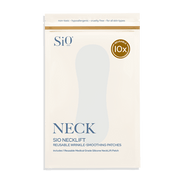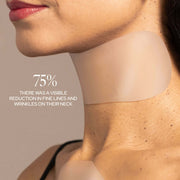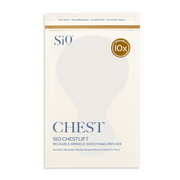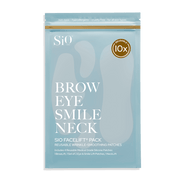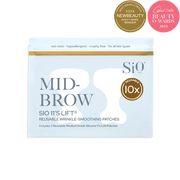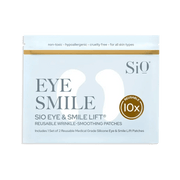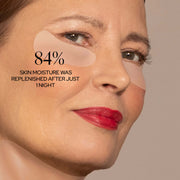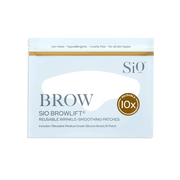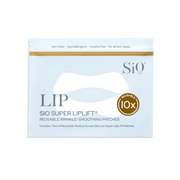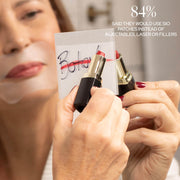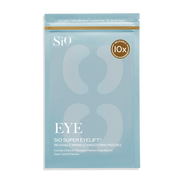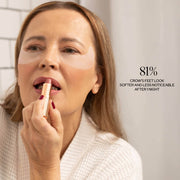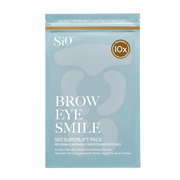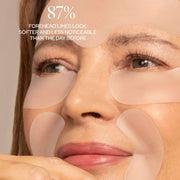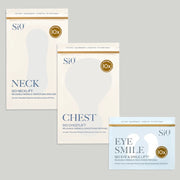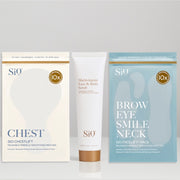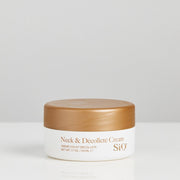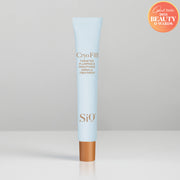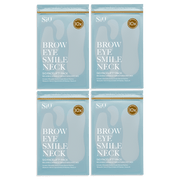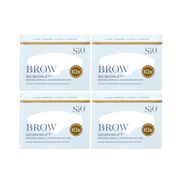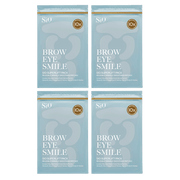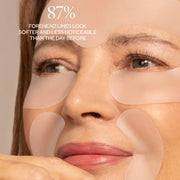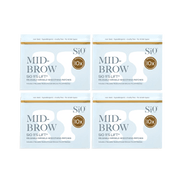The Best Face Mask For Every Skin Type

Face masks are all the rage right now. And for good reason: they do work. But there are just so many options to choose from. You’ve got Korean face masks, charcoal face masks, gelatin face masks, avocado face masks, coconut oil face masks, do-it-yourself face masks...the list literally goes on and on. How is a skin-conscious person to choose?
Then there’s the question, “Which face mask is right for my skin type?” Ack! The issue just got a lot more complicated. And once you do find a mask that’s right for your skin type, how often can you use it without doing more damage to your skin? It’s enough to make you want to quit the skin care game entirely. But before you throw your hands up and abandon your quest for healthy, wrinkle-free skin completely, take a few breaths and let us help. That’s right, the experts at SiO Beauty are going to give you the skinny on the best face masks for every skin type. On top of that, we’ll give you some guidelines to help you determine just how often you can use your face mask of choice. And if that weren’t enough, we’re going to introduce you to a simple-yet-powerful solution that replaces every trendy face mask out there.
That’s a lot to look forward to so let’s get right into it and talk about the conventional wisdom about how often you can use a face mask.
How Often Should You Use A Face Mask?

Conventional wisdom suggests that you only use a face mask once or twice a week. The directions on many products even state this fact. And they’re not wrong. But each type of face mask targets a specific problem. So could you use a charcoal mask on Monday followed by a DIY avocado mask on Tuesday, a Korean face mask on Wednesday, and a honey-and-milk face mask on Thursday?
Theoretically, yes, you could alternate face masks like this. But before you run out and buy every face mask on the drugstore shelf, check the ingredients. The following are safe to use every day:
- Vitamins
- Aloe
- Hyaluronic acid
- Antioxidants
- Niacinamide
Even better is the amazing hydrating mask we’ll talk about at the end of this article (which contains a safe medically proven and clinically approved formula!). But first things first: if the mask states that it is to be used for any of the following purposes on the label, restrict your application to only once or twice a week per the instructions:
- Exfoliating
- Anti-aging
- Anti-acne
Products used for these purposes can contain harsh chemicals that can irritate your skin if used more times than the instructions indicate. So now that we’ve established that you can alternate face masks with different purposes, here are the best options for each skin type.
The Best Face Mask For Your Skin Type
The problem with trying to decide which face mask to use is compounded by the fact that the skin on your face, neck, and décolleté is not the same. Your cheeks are dry while your nose and forehead are oily. Your chin is acne-prone while your neck and chest are sensitive. Not one of the trendy face masks is right for every problem, and the worst thing you can do is use a product that isn’t right for your skin type. So which mask is right for your skin type? Read on to find out. Keep in mind that there is a solution to all the complicated and confusing combinations that revolve around skin types and face masks. We’ll talk about it at the end of this article.
Oily Skin
Treatment for oily skin should not be about stripping off all the excess oil. That only causes more problems because your skin needs some oil to protect itself. The real cause of oily skin is often a lack of moisture. Your body is trying to keep moisture from evaporating by covering your skin with oil that should keep it in. So what your oily skin really needs is hydration. Other face mask ingredients that can benefit and help balance oily skin include:
- Jojoba
- Tea tree oil
- Clay
- Glycolic acid
Avoid masks with pore-clogging ingredients like cocoa butter and beeswax.
Congested skin
Congested skin is often described as clogged skin. The results of this can be a dull, tired appearance and a propensity for blackheads. The right face mask for this type of skin contains:
- Antioxidants
- Clay
- Lavender
- Lactic acid
- Light citric acid
If you choose a mask with clay, make sure it’s not too harsh. How will you know? If it looks black, feels grainy, and cracks when it’s dry, steer clear.
Dry, Dehydrated Skin

Dry, dehydrated skin is the result of a thin, or nonexistent, protective layer that allows moisture to evaporate off the surface of your skin. The best face masks for dry, dehydrated skin are those that promote moisturizing. In addition, look for a product that is rich in antioxidants and nourishing oils. The antioxidants will eliminate free radicals deep in the skin while the nourishing oils will build up the protective layer to keep moisture where it belongs—in your skin
Sensitive skin
Sensitive skin is just begging for calming and detoxifying ingredients. Masks that contain these ingredients can help sooth the breakouts, rashes, and irritation caused by hormones, stress, pollution, and other external toxins. For sensitive skin, less is more. The best choice would be a mask that moisturizes and heals. But other ingredients can be helpful too. Look for a mask with:
- Antioxidants to calm redness
- Green tea to relieve inflammation & swelling
- Lavender to refresh
Whatever mask you choose, avoid those with harsh chemicals and alcohol. These ingredients could cause further irritation to your already sensitive skin.
Acne-prone skin
Acne-prone skin is caused by unbalanced moisture levels. What causes these imbalances? Removing the protective oils from the surface of your skin and then applying pore-clogging creams or balms. We know you would never do this intentionally, but sometimes it just happens naturally because of sun exposure and other pollutants in your environment. Masks with the following ingredients can help calm acne-prone skin.
- Rose
- Clay
- Activated charcoal
- Salicylic acid
Be sure that the mask you use isn’t too harsh when it comes to the clay and the activated charcoal. You don’t want to damage your skin by tearing off the top layer and the sebaceous glands that protect it.
Mature skin

Mature skin needs moisture. It’s as simple as that. For those with mature skin, a moisturizing face mask is your best bet. Other beneficial ingredients include:
- Antioxidants
- Toners like rosewater or chamomile
- Green tea
- Omega-3
- Lactic acid
- Hyaluronic acid
Skip The Face Mask—Wear A Hydrating Patch At Night
Every skin type, whether they’re on this list or not, can benefit from the addition of moisture. Even the toughest of combination skin, be it on your face, neck, or décolleté, can see significant improvement when it has plenty of moisture. The thing is, not all face masks work beneath the skin’s epidermis to provide an environment for this important ingredient. What’s more, some that do claim to moisturize can cause more harm than good with added chemicals and ingredients.
The best way to put moisture into your skin without all the risks that face masks bring is by wearing a silicone skin patch while you sleep. The best of these patches are offered by SiO Beauty. The SiO Beauty silicone power patches contain none of the potentially harmful ingredients that trendy face masks do. SiO patches are just all about the moisture.
Silicone skin patches were developed by doctors and surgeons to help heal stubborn scars and burns. Their use was so successful that they eventually came to the attention of SiO Beauty founder Gigi Howard. Gigi recognized that the same technology used in hospitals could be used to heal less-serious, but still life-altering, conditions like crepey skin and wrinkles on the face, neck, and décolleté.

The silicone skin patch works to correct and prevent wrinkles because of its ability to keep moisture from getting out. Silicone skin patches create a microclimate between the patch and the skin. Moisture that is evaporating off the surface of the skin is trapped under the patch. This extra moisture serves to:
- Plump skin
- Smooth out wrinkles
- Accelerate skin recovery
- Prevent new lines from forming
You don’t have to worry about alternating patches to avoid damaging your skin like you do with face masks. You can wear a silicone skin patch every day. And to make it even easier, the patches are worn at night while you sleep. There’s no muss, no fuss, just all-night wrinkle healing and prevention that is unrivaled in the cosmetic industry.
You can even tailor your silicone skin patch experience with SiO Beauty’s full line of patches. Choose one for your:

Wearing a silicone skin patch while you sleep is like soaking your skin in moisture for six to eight hours. For additional skin-plumping benefits, try SiO Cryo Fill to reduce the appearance of fine lines while providing hydration to volume deficient areas. With this non-invasive alternative to injectables, you will see immediate results and overall improvement with continued use.

